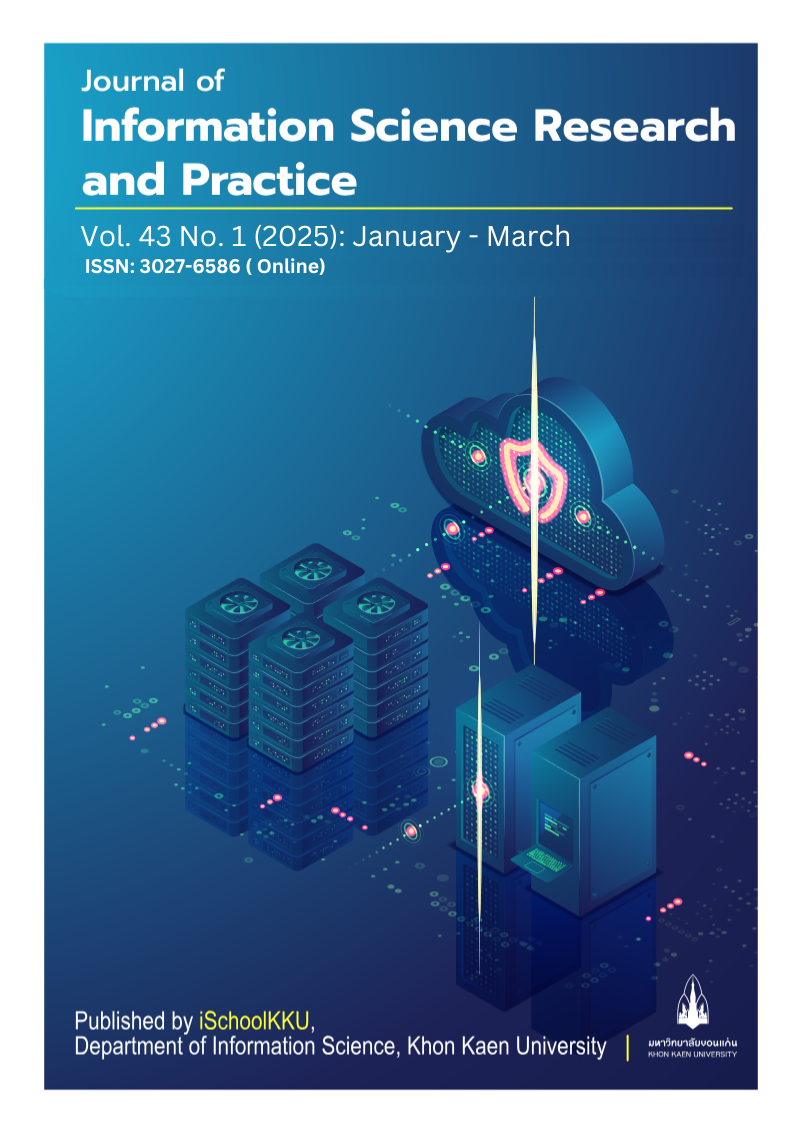Digital DNA: Hands-on Student Perspectives on Digital Skills and Innovation for Future Practical Graduates
DOI:
https://doi.org/10.14456/jiskku.2025.6Keywords:
Digital literacy, Innovators, Hands-On Students, Rajamangala University of TechnologyAbstract
Purpose: To examine students' perceptions regarding the elements of digital literacy and innovator capabilities among Hands-On Students of Rajamangala University of Technology, and to compare these perceptions based on gender and various fields of study.
Methodology: This study employs a quantitative research methodology. Data were gathered using an online questionnaire from students at Rajamangala University of Technology across 9 campuses, resulting in a total of 516 respondents. The data were examined utilizing percentage statistics, mean, standard deviation, and t-test.
Findings: Students possess a strong perspective on all components of digital literacy and innovator for Hands-On Students. The analysis revealed that gender and field of study do not influence opinions on digital literacy and innovator for Hands-On Students.
Application of this study: The study findings indicate that students acknowledge the significance of digital literacy and innovation in preparing them become competent graduates ready for future jobs. Consequently, Rajamangala University of Technology should formulate definitive policies and plans to enhance digital literacy and innovator, thereby cultivating capabilities in these areas.
Downloads
References
American Library Association. (2013). BC’s Digital Literacy Framework. Retrieved from https://www2.gov. bc.ca/assets/gov/education/kindergarten-to-grade-12/teach/teaching-tools/digital-literacy-framework .pdf
Announcement of the Higher Education Standards Committee on the Details of Learning Outcomes According to Higher Education Qualification Standards B.E. 2565. (2022, September 9). Thai Royal Gazette, 139(Special Part 212D), 35–36.
Eshet, Y. (2004). Digital literacy: A conceptual framework for survival skills in the digital era. Journal of educational multimedia and hypermedia, 13(1), 93-106.
Ferrari, A. (2013). DIGCOMP: A framework for developing and understanding digital competence in Europe. Luxembourg: Publications Office of the European Union
International Telecommunication Union. (2024). Measuring digital development: Facts and Figures 2024. Retrieved from https://www.itu.int/en/ITU-D/Statistics/pages/facts/default.aspx
JISC. (2014). Developing digital literacies. Retrieved from https://www.jisc.ac.uk/full-guide/developing-digital-literacies
Jongsermtrakoon, S. & Nasongkhla, J. (2015). A Group Investigation Learning System for Open Educational Resources to Enhance Student Teachers' Digital Literacy & Awareness in Information Ethics. International Journal of Information & Education Technology, 5(10), 783.
Kessalee, K. & Kwiecien, K. (2018). Digital literacy in the workplace for supporting staff, Loei Rajaphat University. (In Thai). Humanities and Social Science Journal of Graduate School, Pibulsongkram Rajapbhat University, 12(1), 503-514.
Kulavijit, B. (2022). Digital literacy of Silpakorn University’s Undergraduate Students, Sanam Chandra Palace Campus. (In Thai). TLA Bulletin, 66(2), 115-130.
Laoreiam, P. (2020). Test development of assessing multidimensional digital literacy for matthayomsuksa one by applying construct modeling. (In Thai). Thesis of Master of Education (Educational measurement, Evaluation and Research) Faculty of Education, Srinakharinwirot University.
Law, N., Woo, D., de la Torre, J., & Wong, G. (2018). A Global Framework of Reference on Digital Literacy Skills for Indicator 4.4. 2, Information Paper No. 51. Montreal: UNESCO Institute for Statistics
Leenaraj, B. (2017). Digital literacy skill for developing learning quality. T.L.A. Bulletin, 61(2), 76-92.
Martin, A., & Grudziecki, J. (2006). DigEuLit: concepts & tools for digital literacy development. Innovation in Teaching and Learning in Information and Computer Sciences, 5(4), 1-19. https://doi/abs/ 10.11120/ ital.2006.05040249
MediaSmarts. (n.d.). Digital Literacy Fundamentals. Retrieved from http://mediasmarts.ca/digital-media-literacy/general-information/digital-media-literacy-fundamentals/digital-literacy-fundamentals
Office of the Higher Education Commission. (2020). Higher Education Information. (In Thai). Retrieved from http://www.info.mua.go.th/info/
Office of the National Digital Economy and Society Commission. (2023). National policy and plan for digital development for the economy and society. Retrieved from https://onde.go.th/view/1/Digital_ Development_for_National_Economic_and_Social_Development/EN-US
Phuapan, P., Viriyavejakul, C., & Pimdee, P. (2016). An analysis of digital literacy skills among Thai University seniors. International Journal of Emerging Technologies in Learning (iJET), 11(03), 24-31.
Prapinpongsakorn, S., Kaeophanuek, S. & Rattanavongsa, R. (2018). Proposing a Workshop Model to Enhance Digital Literacy Skills Using Online Tools. PULINET Journal, 5(3), 98-106.
Rajamangala University of Technology Act. (2005, January 18). Thai Royal Gazette, 122(6A), 17–45.
Rajamangala University of Technology Thanyaburi. (2016). Graduate Practitioners. (In Thai). Retrieved from https://www.rmutt.ac.th/about/graduate-practitioners
Taphangphinijkarn. A. & Chaemchoy, S. (2023). Disruptive innovator skills of students of education sandbox schools under the secondary service area office Kanchanaburi. Journal of educational review, Faculty of Educational in MCU, 10(1), 217-231.
Techataweewan, W. & Prasertsin, U. (2016). Digital literacy assessment of the undergraduate students of the universities in Bangkok and its vicinity. Journal of Information Science, 34(4), 1-28.
UNESCO international centre for Technical and Vocational Education and Training. (2024). Digital literacy. Retrieved from https://unevoc.unesco.org/home/TVETipedia+Glossary/lang=en/ show=term/term= digital+literacy
Wongyai, N. (2017). A guide to developing digital literacy skills of digital native. Veridian E-Journal, Silpakorn university, 10(2), 1630-1642
World Economic Forum. (2025). Future of jobs report 2025: insight report. Retrieved from https://www.weforum.org/reports/the-future-ofjobs-report-2025/
Yamane, T. (1973). Statistics: an introductory analysis (3rd ed.). New York: Harpe.








